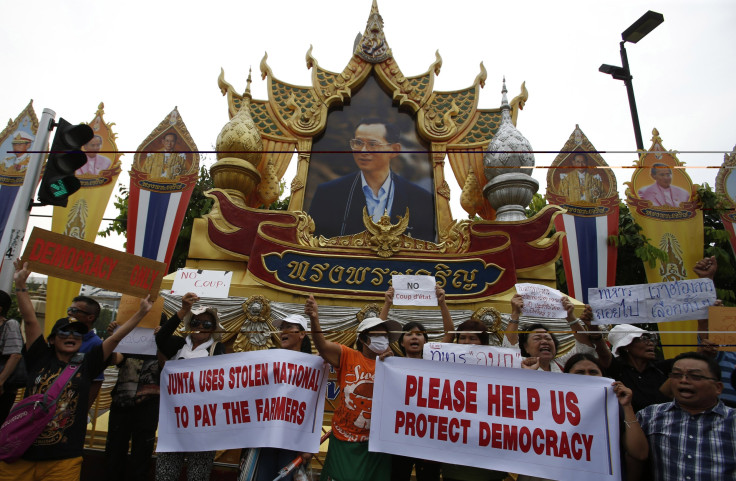Thai King Endorses Junta Leader As Prime Minister

(Reuters) - Thai military leader General Prayuth Chan-ocha was endorsed as prime minister by Thailand's king on Monday, four days after he was elected by his own hand-picked parliament, although critics called his appointment a political farce.
Prayuth was appointed prime minister on Thursday, three months after leading a coup, by 191 out of 197 members of the military-dominated national assembly. He was the sole candidate.
Approval from King Bhumibol Adulyadej was a formality. His endorsement paves the way for the establishment of an interim government in coming weeks, although power will remain firmly in the hands of the junta formally known as the National Council for Peace and Order (NCPO).
"His Majesty the King has endorsed General Prayuth Chan-ocha as prime minister to govern the country from this day onwards," the Royal Gazette said in a statement published on its official website on Monday.
The military said the May 22 coup was necessary to avoid further bloodshed after months of turbulence pitting protesters, including the urban elite and southern Thais, against supporters of ousted Prime Minister Yingluck Shinawatra.
Dressed in a crisp white military uniform, Prayuth got down on his knees and paid homage to a portrait of King Bhumibol at a ceremony in Bangkok on Monday.
King Bhumibol, 86, who is in a Bangkok hospital for what the palace said is a routine medical check-up, did not attend.
"I consider this the highest honor of my life," Prayuth said in a televised address after the ceremony.
"Our country has accumulated many problems over the years which need to be urgently solved. To do this we must not create future problems," he said.
Critics have denounced the coup and the junta's self-described efforts to "return happiness to the Thai people".
The Organisation of Free Thais for Human Rights and Democracy, a group set up overseas to oppose the junta, called Prayuth's selection illegitimate.
"The NCPO's selection of Prime Minister is only a political farce and in violation of the rule of law," Charupong Ruangsuwan, the group's secretary general, said in a statement posted on Facebook.
The junta has cracked down on issues ranging from food hawkers at tourist destinations, the illegal logging of forests, and taxi mafia gangs at international airports.
Prayuth, who is due to retire as army chief in September, moved quickly to silence dissent and deployed troops to quell protests in the weeks after the coup.
The junta has tried to sell a positive story and has pointed to modest improvements in the economy and consumer confidence since the takeover.
Southeast Asia's second-largest economy avoided recession in the second quarter of the year but the tentative recovery is some way from matching the government spin.
Prayuth, 60, was a key figure in the 2006 coup that ousted Yingluck's brother, former Prime Minister Thaksin Shinawatra. Thaksin has lived in self-exile since 2008 to avoid serving a jail sentence for corruption charges he denies.
Prayuth has said he wants to free Thailand from a vicious cycle of political instability but critics say his rhetoric, including nostalgia-tinged references to an agrarian utopia and a "return to morality in Thailand", is outmoded and threaten to drag Thailand back by decades.
© Copyright IBTimes 2025. All rights reserved.





















